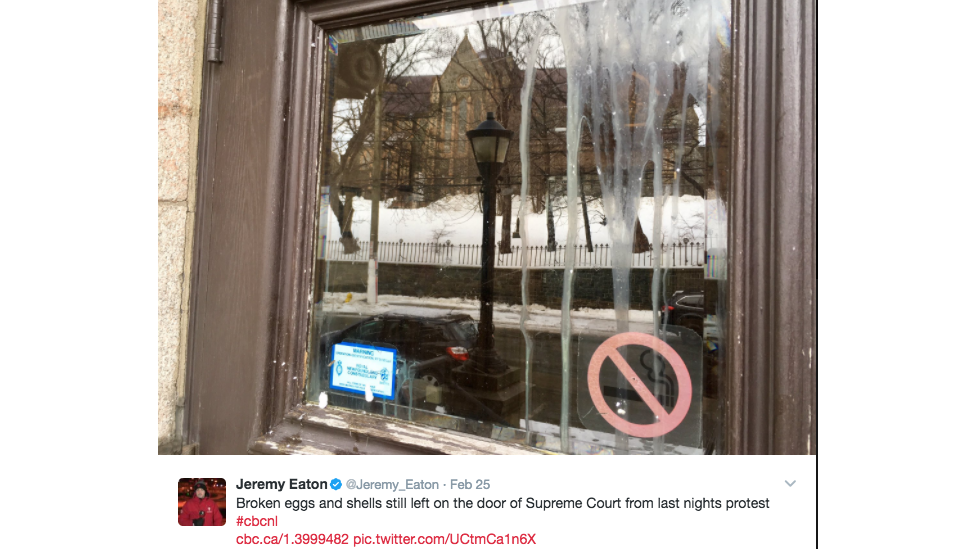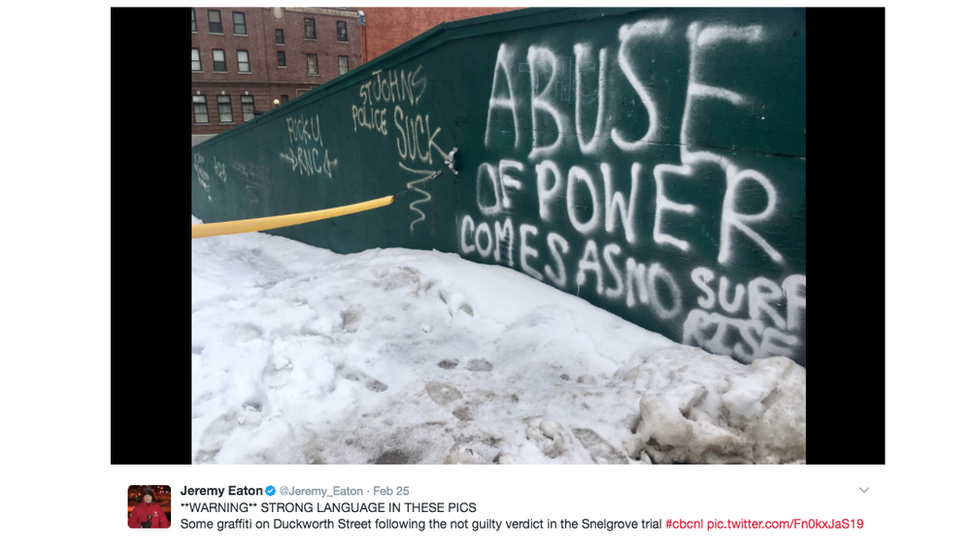Uproar as Canadian constable cleared of on-duty rape
- Published

Egg yolk and coffee stains the window of the Supreme Court of Newfoundland and Labrador, where a police officer was acquitted of rape on Friday
A jury's decision to acquit a Canadian police officer of raping a woman after giving her a lift home has sparked uproar in a small coastal city.
Protesters gathered on Monday outside court in St John's, Newfoundland, to demand the constable be fired.
Pc Carl Douglas Snelgrove, 38, was cleared on Friday of raping a 21-year-old woman at her apartment while he was on duty on 21 December 2014.
After the verdict, demonstrators threw eggs and coffee at the court.
The married officer, who has served with Royal Newfoundland Constabulary for a decade, is expected to face disciplinary action.
On Monday, hundreds of protestors gathered again outside court, holding signs that said "We believe her" and "Let's talk about consent".

Angry citizens continue to protest the ruling, and have sprayed this fence with anti-police graffiti
The prosecution had argued that the complainant was too drunk to consent to sex with the police officer, who was in uniform when he picked up her up outside a downtown bar.
The complainant said she was too intoxicated to recall if she consented to sex.
Upon the jury's not-guilty verdict, Mr Snelgrove broke into sobs, local media reported.
He was greeted by family, including his wife, and other supporters.
His lawyer, Randy Piercey, told the court his client was an "idiot who made a bad decision", external, but did not commit rape.
Speaking to the BBC on Monday, Mr Piercey said he was not surprised by the verdict, because the jury would have had to believe beyond reasonable doubt that the complainant was too drunk to consent, and that his client knew that.
During the trial, both the complainant and the officer agreed to certain facts about what happened that night, local media reported.
The accuser asked him for a ride home because she was lost.
The officer helped her break into her house because she could not find her key.
But then their stories diverged.
Mr Snelgrove said the woman had invited him into her apartment and initiated sex, and that she appeared cogent and clearheaded throughout the evening.
The jury heard testimony from a toxicologist who said the woman might have blacked out, which means she could have given consent and not remembered it.
Judge Valerie Marshall cautioned that "mere drunkenness" did not mean the complainant was incapable of consent.
During court proceedings, some readers were incensed when a local newspaper ran the headline "Too drunk to remember".
The paper later apologised. , external
RNC Chief William Janes told media that Mr Snelgrove has been suspended without pay since he was charged in June 2015.
Now that the trial is over, he faces possible further disciplinary action through the Public Complaints Commission process.
"I want to assure the public that we do not tolerate inappropriate and unprofessional behaviour by our officers and take complaints from the public very seriously," he said in a statement.
The prosecution has 30 days to appeal the verdict.
- Published25 February 2016

- Published18 November 2016